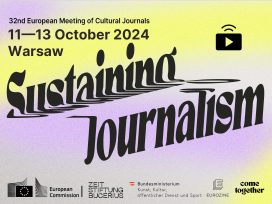Sustaining Journalism—32nd European Meeting of Cultural Journals
The 32nd European Meeting of Cultural Journals will focus on sustaining independent cultural journalism in an increasingly difficult public sphere. As an industry, the cultural and community media spheres in Europe are affected by shifting public funding models, digitised markets, audience expectations, and political interference. Bringing together Eurozine’s network partners and cultural professionals, as well as local audiences, the conference will explore:
(a) ownership and labour in media;
(b) public funding models in Europe; and
(c) politics encroaching on independent cultural journalism.
We will discuss how these shifts in the cultural field are affecting both journalism and audiences in Europe. The conference will feature a keynote discussion and two panel discussions, as well as presentations from our partners in the Come Together Creative Europe Journalism Partnerships project. Internal sessions will allow network members and interested participants to workshop industry-specific questions and themes.
The sessions will be live-streamed, recorded, and published here.
Register here
Programme
Friday 11th October
Arrivals in the morning
Location: Pałac Staszica (Staszic Palace)
15:00-18:00 – Introduction and internal networking
18:00-20:00 – Keynote
The beautification of war: Digital communications, public indifference, rebel journalism and civilian resistance in the age of meta wars
by John Keane, professor of politics, University of Sydney, Australia
Digital communications technologies are nowadays enabling not only frightening transformations of the modes and weapons of warfare, but also media representations of war ‘gamify’ war and lullaby millions of people into indifference. But this public indifference is vulnerable to a counter-trend unique to the age of meta wars: the birth of new media platforms whose rebel journalists digitally expose the terrible realities of these wars, cast doubts on their moral and practical necessity, and teach civilians everywhere that they have the right not to suffer meta wars, even that there’s a time coming when war in every form will have to be abolished.
Discussion with
Ivana Dragičević, journalist and executive producer international news, N1, Zagreb
Radosław Markowski, professor of political science and director of the Centre for the Study of Democracy, SWPS University of Social Sciences and Humanities, Warsaw
20:00 – Standing Dinner
Saturday 12th October
Location: Centrum Bankowo Finansowe
09:00-09:15 – Come Together introduction
09:15-10:45 – Internal session: Securing EU funding for cultural media
Securing EU funding for cultural media has always been a struggle. As an industry, cultural media fall neither into the bracket of traditionally defined cultural organisations, nor into the confines of news-based media. As EU funding guidelines and evaluations become more stringent with every call, this internal session will offer a space to discuss and share experiences on how to best approach EU funding calls as cultural journals.
Moderated by
Miljenka Buljević, Kulturtreger and Booksa, Zagreb
Adam Reichardt, editor of New Eastern Europe, Kraków
10:45-11:00 – Break
11:00-12:30 – Internal session: Fact-checking to sustain quality journalism
In Poland specifically, but in many other contexts also, fact-checking has gone awry. But to sustain the quality of journalism, and to curtail the spread of disinformation, it is crucial that journalists and publishers are able to fact-check effectively. This session will highlight practical steps for efficient fact-checking.
Moderated by
Marcin Czajkowski, PISMO magazine
12:30-14:00 – Lunch
14:00-15:30 – Panel discussion
Political shifts, media freedoms and cultural journals with
Anne-Lorraine Bujon, managing director at Esprit, Paris
Mustafa Ünlü, director at P24, Istanbul
Tomáš Hučko, editor-in-chief of Kapitál Noviny, Bratislava
Media concentration and political power stand in a complex relationship. While it is often the case that weak governments are excessively influenced by under-regulated media, homogenous media landscapes tend also to be a corollary of repressive regimes. In Europe, shifts towards the far right are likely to find less resistance where media diversity is lacking. This panel will be exploring these issues from the perspective of cultural journals, asking how they work in contexts where states exert political pressure on the media, or where emergent constellations of media ownership and political power give cause for concern.
Moderated by Simon Garnett, senior editor at Eurozine, Vienna
15:30-16:00 – Break
16:00-17:30 – Panel discussion
Bullshit journalism: career paths of young journalists with
Paulina Januszewska, journalist at Krytyka Polityczna, Warsaw
Paula Cardoso, journalist, activist and founder of Afrolink, Lisbon
Ivana Dragičević, journalist and executive producer international news at N1, Zagreb
To advance in their careers, young journalists today are required to provide labour and work that does not meet the standards of rigorous journalism. In other words, they are asked to perform and produce ‘bullshit journalism’. Women, LGBTQIA+ and BIPOC (Black, Indigenous, People Of Colour) journalists in Europe face additional challenges when working towards a journalistic career. This panel will discuss the effects this has not only on the profession of journalism, but on audiences and their expectations of media also.
Moderated by Luka Lisjak Gabrijelčič, historian, essayist and editor at Razpotja, Ljubljana.
18:30 – Dinner at Runo Restaurant
Sunday 13th October
Location: Centrum Bankowo Finansowe
10:30-12:00 – Internal session: Representing Palestinian voices moderated by Eurozine’s Editorial Board
How have we managed to represent Palestinian voices before and after October 7th, 2023? This session will explore questions that arise for the actions of publishing, editing and commissioning around the events of October 7th, before and thereafter in Palestine, Israel and their affected neighbours, like Lebanon. We will discuss the national discursive landscapes of the respective contexts in which cultural journalists and editors are publishing. Networks, like Eurozine, have an advocacy and supportive function. We will discuss Eurozine’s role with respect to its partner journals when it comes to publishing on the current war in Gaza and the persistent conflict and its historical and future developments. This will lead us to explore in greater depth the voice and task of cultural journals in relation to ever present news feeds.
Moderated by
Ann Ighe, editor of Ord&Bild, Göteborg
Miriam Rasch, Willem de Kooning Academy, Rotterdam
12:00-14:00 – Closing remarks and lunch
14:45-16:45 – Excursion: From Critical-Lifestyle to Zines: walking tour of Warsaw’s cultural magazine scene by Bęc Zmiana. Meet at Księgarnia Bęc Zmiana
